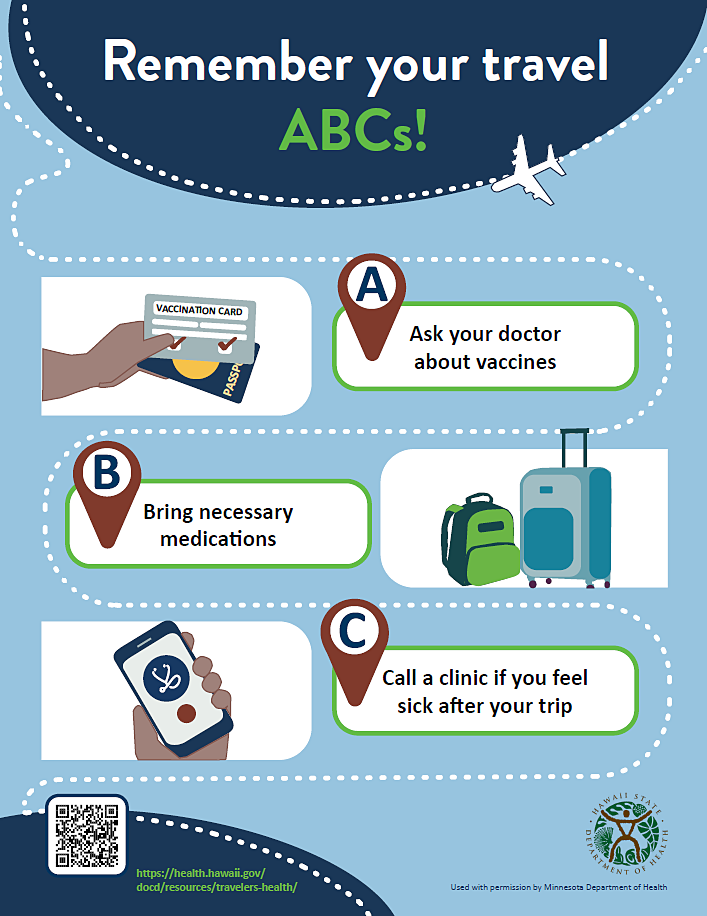Preparing carefully and thoughtfully for travel can make all the difference. Whether you’re leaving the islands for business or pleasure, it is always a good idea to check to see if there is a risk of infectious diseases actively circulating at your destination. The Centers for Disease Control and Prevention (CDC) regularly posts the most up-to-date travel notices on its website.
Understanding the risks of visiting a specific location can help you better prepare to enjoy your travel and return to the island disease-free. Hawai’i is fortunate that some of the most harmful diseases are not endemic here, meaning they are not being spread locally. Let’s work together to keep it that way. Although you may feel fine while traveling, if you contract a disease or virus overseas and return home to Hawai’i, you risk spreading it to others you come in contact with.
The state of Hawai’i no longer requires COVID-19 vaccination for entry. For more information on respiratory viruses, please visit https://health.hawaii.gov/docd/disease-types/respiratory-viruses/

General Travel Tips
Check your destination to determine destination-specific health and safety risks before traveling. To view any international health notices, please visit CDC Travel Health Notices.
Stay up to date on all routine vaccines. Before traveling, you should be up to date on your routine and recommended vaccinations, including measles, mumps, and rubella (MMR), diphtheria, pertussis, and polio. Routine vaccinations protect you from infectious diseases such as measles, which can spread quickly in groups of unvaccinated people.
Stay home when sick. If you have a fever or feel unwell during travel, stay home and avoid travel.
Practice good hygiene. Regular handwashing is one of the best ways to avoid getting sick and prevent the spread of germs to others. Wash your hands with soap and water; if not, use hand sanitizer containing at least 60% alcohol.
Avoid bug bites. Bugs, including mosquitoes, ticks, fleas, and flies, can spread malaria, yellow fever, Zika, dengue, chikungunya, and Lyme. Use insect repellent (containing one of the following substances: DEET, picaridin, citriodiol, IR3535) to exposed skin and prepare accordingly if traveling to an area where arboviral disease is endemic.
Choose safe food and drinks. Contaminated food and beverages can cause travelers’ diarrhea and disrupt your travel. Generally, foods served hot or in packages are safe to consume, and bottled, canned, and hot drinks are usually safe to drink.
Prepare a travel health kit with items you may need, including items that may not be available to purchase at your destination. Include your prescriptions and over-the-counter medicines in your travel health kit and take enough to last your entire trip, plus extra in case of travel delays. Depending on your destination you may also want to pack a mask, insect repellent, sunscreen (SPF15 or higher), aloe, alcohol-based hand sanitizer, water disinfection tablets, and your health insurance card.
Get travel insurance. Have a plan to get care overseas in case you need it. Find out if your health insurance covers medical care abroad. Travelers are usually responsible for paying hospital and other medical expenses out of pocket at most destinations.
Visiting Hawaii
Protect yourself from the sun. Avoid prolonged sun exposure if possible. Apply sunscreen with SPF15 or higher to avoid sunburn.
Avoid swimming or wading in freshwater streams or ponds. It is important to avoid swimming in fresh water especially with any open wounds as it can increase the risk of contracting the bacterial disease Leptospirosis.
Be cautious during water activities. Please observe all posted signs and warnings when visiting the coast. Hawai’i beaches may experience strong surf conditions, jellyfish, brown water advisories, and other safety warnings. For current beach conditions while visiting Hawai’i, go to Hawaii Safe Beach Day.
Choose safe food and drinks. To prevent illnesses transmitted through food and water, consume thoroughly cooked food and wash fruits and vegetables if they are not peeled. Avoid the consumption of raw or undercooked snails or slugs, and ensure all produce being consumed is washed thoroughly. Consumption of snails, slugs or produce contaminated by them can increase your risk of contracting Angiostrongyliasis (Rat Lung Worm) disease.
Leaving Hawaii
Stay up to date on all routine vaccines. Before traveling, you should be up to date on your routine and recommended vaccinations, including measles, mumps, and rubella (MMR), diphtheria, pertussis, and polio. Routine vaccinations protect you from infectious diseases such as measles, which can spread quickly in groups of unvaccinated people.
Choose safe food and drinks. Contaminated food and beverages can cause travelers’ diarrhea and disrupt their travel. Generally, foods served hot or in packages are safe. Bottled, canned, and hot drinks are usually safe to drink.
Avoid bug bites. Bugs, including mosquitoes, ticks, fleas, and flies, can spread malaria, yellow fever, Zika, dengue, chikungunya, and Lyme. Use insect repellent (containing one of the following substances: DEET, picaridin, citriodiol, IR3535) to exposed skin and prepare accordingly if traveling to an area where arboviral disease is endemic. Wearing long shirts and pants can also help to avoid bug bites.
Prepare a travel health kit with items you may need, including items that may not be available to purchase at your destination. Include your prescriptions and over-the-counter medicines in your travel health kit and take enough to last your entire trip, plus extra in case of travel delays. Depending on your destination you may also want to pack a mask, insect repellent, sunscreen (SPF15 or higher), aloe, alcohol-based hand sanitizer, water disinfection tablets, and your health insurance card.
Be safe around animals. Avoid animals, including pets, local farm animals, and wild animals. In addition to the risk of rabies, all animal bites carry a risk of bacterial infection.
After Travel
If you traveled recently and feel sick, consult a healthcare provider and tell them about your recent travel history.
Travel Immunization Resources
Additional Resources
Healthy Travel
English | ʻŌlelo Hawaiʻi (Hawaiian) | Ilokano (Ilocano) | 日本語 (Japanese) | Español (Spanish) | Tagalog
Leptospirosis
English | ʻŌlelo Hawaiʻi (Hawaiian) | Ilokano (Ilocano) | 日本語 (Japanese) | Español (Spanish) | Tagalog
Wound Care
English | ʻŌlelo Hawaiʻi (Hawaiian) | Ilokano (Ilocano) | 日本語 (Japanese) | Español (Spanish) | Tagalog
Last reviewed July 2025

